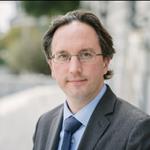
Annie Burridge
(Austin Opera)
Burridge, an alumna of OPERA America’s Leadership Intensive program, spent nine years at Opera Philadelphia, where she oversaw the development, marketing and communications departments, spearheaded a rebranding campaign and, as managing director, helped pave the way toward the company’s phenomenally successful festival, O17. She took the reins at Austin Opera in October 2016.
SCORCA: You were in a prime deputy position in Philadelphia. What about being a general director is different?
BURRIDGE: I’m not sure whether the role is different, or the community. I learned so much from David [Devan, general director] in Philadelphia, but we’re different people. I had to figure out how to use the things that I admired so much in him in a way that would be authentic to my own leadership, and meanwhile adapt to the very different culture here in Austin.
What you seem to be saying is that being a general director isn’t a cookie-cutter role, directly transferable from one city to another.
Right. I spent about 50 to 60 percent of my time in Philadelphia working with our board. I was on nearly all the committees and led half of them. So I figured board relationships would be a piece of cake. But I went from a board that was comfortable governing to one that had never served in that capacity, and that was a big change. I also didn’t have a good sense of how things had happened before because there was such a long break between [former general director] Joe Specter’s departure and my arrival. It was hard to ground myself in the reality of the board members who had been there a long time.
They have a history; you don’t.
Yes. There were things that I would propose that were standard practices in the business that were completely foreign to the board in Austin. Also, during the few months between Joe and me, board members were actually running the company. They had stepped into staff roles and served as interim leaders. They had already had hands-on operational involvement, and lines became even more blurred during that interim.
My guess is you have to experiment with what works and what doesn’t as a leader.
There were a few times that I provoked a flurry that I did not expect. I thought, “Well, that was really valuable,” because now I knew where folks were coming from.
Did you encounter challenges in building a staff?
It was easier than I thought it would be. When I got here, there were lots of open positions. Many of the people I brought in I had known for some time. But the critical question is, how do you combine a legacy staff with new staff? I invested a lot of time in that. I made sure that long-serving staff were an integral part of the hiring process: coming up with job descriptions and interviewing the new people. I’m really pleased with the results.
How have you gone about building your profile in the community?
It has been great fun. Austin is such an interesting place. My family and I will go to the rodeo one weekend, then to a black-tie affair the next. My board has been great about inviting me to events. My peers at other organizations have been incredibly generous in reaching out to me. It means a lot of evenings out, but I find ways to incorporate my family. I love being an opera representative.
How do you gauge if you’ve created a positive working culture?
I ask my staff for feedback often, and many of them are comfortable giving it.
Some of them can’t believe that when there’s a decision to be made, I round them up and talk about it. We figure out so many things at the table. Some of the best ideas for marketing initiatives might come from a completely different department, and everybody is comfortable with that. The quality of the brainstorming exceeds my expectations every time.
Do you have any advice for someone who’s in the same position as you were a couple of years ago, preparing to take the reins for the first time?
I wish I’d had formal a mentor, the way Ryan Taylor had arranged a formal relationship with Kevin Smith when he went to Arizona. Also, I should have asked more questions during the interview process. If I had been more diligent in the depth and repetitiveness with which I asked questions during that process, establishing mutual expectations upon my arrival would have been simpler.
The number-one role can be lonely. You have nobody you can unburden yourself to. When you’re the leader, you aren’t supposed to cry on the shoulders of staff members. Who do you talk to? Whom do you turn to for support, feedback and advice?
That element has been new, and very difficult, but my peers at other performing-arts organizations have been terrific — they’ll return a call in the middle of the night. And my fellow general directors in opera have been fantastic in responding when I have a question. I wouldn’t have made it through my first year without you and Ryan, and also Perryn Leech and Tim O’Leary.

Andrew Jorgensen
(Opera Theatre of Saint Louis)
Jorgensen joined Washington National Opera in 2012 as director of artistic planning and operations, and recently has served as the company’s interim executive director. He assumed the general director post at OTSL on July 1.
SCORCA: What kind of leader do you expect to be at Opera Theatre of Saint Louis?
JORGENSEN: That’s the question I’ve been thinking about as I take this big step forward. Leading as an interim director at Washington National Opera, I have learned to have enormous respect for the intelligence and passion of my colleagues, and also to have respect for the limits of my own knowledge. Everyone I’ve worked with at WNO — and I’m sure this will be true at Opera Theatre — knows more about their area of endeavor than I do. My responsibility is to direct our strategy to ensure we are moving in the right direction, while giving room for people to act as autonomously as they can. It’s like being in charge of a sandbox. I’m not supposed to make the sandcastle, but I’m supposed to help build the sandbox, put sand in it and give everyone the very best tools they possibly can have. That’s not to abdicate leadership, but if we’re doing our jobs properly, then [OTSL music director emeritus] Stephen Lord and [artistic director] Jim Robinson will have a vision for a sandcastle, and my job is to make sure that all of the people around them have the tools to help them build it.
One thing that came late to me personally, as a leader, was the ability to live in curiosity, to live in the question, and not to feel I needed to inhabit the area of knowing.
That’s exactly what I’m trying to get to! How can I ask questions, push people and get conversations going, without ever hoping to understand their areas as deeply as they do?
What do you anticipate being your greatest areas for learning?
I think managing and working with a board will be a tremendous area for growth. I’m blessed at Opera Theatre because it has a large, active board that is in many ways a model of good governance. So while I’ll be learning, I will have the benefit of coming into a situation of established good practices.
What about the task of building your leadership profile in the community?
I don’t worry so much about that. The trick is to keep focused on the art we want to produce, and the statements we want to make. I’m happy to be a spokesperson for those. If a profile in the community emerges, it will be less because of me and more because of the entire team.
Are you ready to be at the top of the pyramid?
I’m a person who thrives on collaborative decision-making, but there’s also something called “paralysis by analysis.” The responsibility for all outcomes ultimately accrues to the general director. Owning that with security, without being defensive, and with the idea that you can’t always talk about every single decision with everybody — that will be a learning curve for me.
Do you have mentors to help you through that learning curve?
I remember a conversation you and I had years ago where you encouraged me to think about the poise and impeccable demeanor of Charles MacKay. I tend to lead with enthusiasm, which is a great way to start, but it only gets you so far. There’s also gravitas, and the kind of elegance I see in people like Charles. People like that, people who are trusted and respected, will help me gain perspective on the issues I’m likely to face.
Imagine you could talk to a great general director in the sky. What question would you ask?
I’d like to ask Rudolf Bing, or Ardis Krainik, or whoever that great general director is, about how you can make big, exciting, risky artistic decisions and know they’re right. I would have loved to be in the room when Jim Robinson, Tim O’Leary and Stephen Lord said, “We’re going to commission an opera in jazz about a gay boxer.” Of course, nobody has a perfect batting average. But how do you take those measured risks that will garner the right kind of artistic and public success?

Matthew Shilvock
(San Francisco Opera)
Shilvock met David Gockley, his predecessor at San Francisco Opera, when he was a participant in OPERA America’s fellowship program. He worked alongside Gockley at Houston Grand Opera (2002–2005) and in San Francisco (2005–2016), assuming the role of SFO’s associate general director in 2010. He began his tenure as SFO’s general director in August 2016..
SCORCA: You’ve almost completed your second year as general director. You’d been David Gockley’s right hand for a decade, but have there been any surprises in the number-one role?
SHILVOCK: The first one is that the press doesn’t edit you! I always thought they’d clean up your grammar, but they don’t. That was a rude awakening! On a similar theme, I’m not sure I was prepared for the amount of public speaking the job demands. Every time you walk into a room, someone expects you to say something erudite and meaningful. I knew what it meant theoretically from seeing David, but the reality of being the person everyone turns to for some nugget of inspiration was new to me. Since I’m not a natural public speaker, that was something I had to work at, but you realize the more you flex that muscle, the easier it becomes.
Even though you undoubtedly learned much from David, you probably have had to do some significant retooling to make what you’re doing your own.
Getting David’s perspective on leadership for 12 years was a huge benefit: The rhythm of the job wasn’t new to me. But how do you find your own honest and authentic leadership style? If you’re not completely authentic to yourself, it won’t resonate, because people won’t see it as you.
As an inside candidate, did you encounter any difficulty establishing trust and authority among people who had been your peers?
I don’t know if it’s a different challenge than coming in from the outside, but I certainly think there was a huge benefit in knowing the players: not just the executive team, but the orchestra, the chorus, the people on the crew. I already knew what the capabilities of the organization were, so I didn’t feel the need to push or question those in a way an incoming person might have. With the exception of canceling one whole title for budgetary reasons, I didn’t uproot any pre-planned seasons; I didn’t feel I had to change productions and put my stamp on things that early. But within the first few days, we announced a major restructuring of the executive team. Then I began rolling out some new communication strategies, like the backstage e-mails I’m doing on a biweekly basis. Things that said: “This is a new chapter.” Not in any way criticizing what had gone before, but changes that reflect my management style.
Now that you’re at the top of the pyramid, where can you seek help? Who do you talk to?
I do feel the isolation of being in this office. Even geographically — there’s a “moat” of an outer office you have to get through before you come in. But there’s also a mental moat. It’s my responsibility to reach across the moat and make sure that dynamic conversations with colleagues are still happening. Structuring the executive team as a small group of very close colleagues — five managing directors — has enabled us to be a little more open, a little more vulnerable. Another important step is developing relationships with other general directors, especially since San Francisco sometimes feels like the very edge of the world. And I’ve joined a group called the Young Presidents’ Organization [a global network for young CEOs], where you can be completely honest about leadership issues, with people who have no stake in the game whatsoever.
What do you see as indications of your success?
I’m looking for a way to measure the morale and happiness of the organization. People give so much of their time, earning what aren’t necessarily the highest salaries in the world, because they believe passionately in the art form. I want to make sure that the work is seen joyfully and that it excites people.
Now that you are a couple years into the job, do you have any advice for brand-new general directors, like Andrew Jorgensen at Opera Theatre of Saint Louis?
A couple of things come to mind. One is to carve out time for strategic thinking. You get inundated with things that fill every second of every day, but on a plane or on Christmas break, you should sit down with a blank piece of paper and a problem or an idea and give yourself that luxury. And you have to remember that you are the bellwether for the company and its morale. So no matter how difficult the job is, how complex the budgets may be, you need to be optimistic and joyful, and celebrate other people — give them the assurance that there’s a bright future ahead — while at the same time remaining transparent, not shying away from sharing the challenges, so they aren’t surprised when those challenges become manifest.




